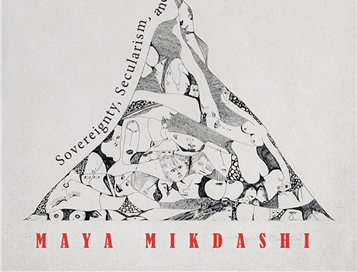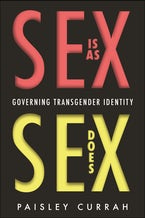Eons ago (1994) I wrote an essay titled “Queering the State” (included in my book Sex Wars) that asked the question—why does the state regulate gender and sexuality? Can we disestablish the gender binary and heterosexuality, by removing it from all state action? Can we swap the right wing slogan No Promo Homo for No Promo Hetero? In 2003, in Twilight of Equality? I argued that our thinking and strategies need to take account of the ways that states and sexes are embedded in the political economy of changing formations of racial capitalism—we need to go beyond “homonormative” strategies that aspire only to recognition and inclusion, to work toward transformative redistribution upward of power, money, and cultural clout. Toward this end, I collaborated on a special e-book issue of The Scholar and the Feminist Online, “A New Queer Agenda,” that argued in 2012 for a politics that addresses the needs of most queer people (eradication of poverty, prisons, economic inequality and racist policing; universally accessible healthcare, childcare, reproductive justice, and more) rather than the needs of *only* queer people (an approach that centered the agenda of the most prosperous and privileged).
Scholarship and activism have thankfully come a long way in the last decade, with a library of studies and a plethora of political strategies aimed at the nexus of sexes, states and political economies. There are two new books that are especially exciting and illuminating. Paisley Currah’s Sex Is as Sex Does: Governing Transgender Identity (NYU Press) and Maya Mikdashi’s Sextarianism: Sovereignty, Secularism and the State in Lebanon (Stanford University Press).
The creative methods of each book lie at the heart of their substantive interventions. Currah sets aside notions of “identity” and “the state,” along with the assumption that the injustices transgender people face are attributable simply to transphobia, in order to investigate the ways that state agencies and actors regulate “sex” in widely varying and often inconsistent ways. Someone can get their sex reclassified on a driver’s license but not on a birth certificate? In one state and not another? Rather than stop at noting the inconsistencies and calling for freer rights of reclassification, Currah goes deeper. He wants to know what the hell states are trying to accomplish when they regulate sex. He finds it most useful to ask not what sex is (genitals? gender identity?) so that it can be correctly classified, but what sex does for the classifiers. He lays a foundation by asserting that “sex,” for his purposes, is what a given state agency says it is—and nothing more. He reviews all the queer/feminist/trans discussions and debates over definitions and meanings of gender and sex, and decides not to decide—in favor of just looking at what is going on when different parts of the administrative state classify sex—to what end? Then he reviews various theories of “the state”—liberal, deconstructive and Foucauldian (oddly, he does not explicitly review the Marxist theories?)—and decides that, for his purposes, there is no unitary state. Drawing on Timothy Mitchell’s influential work on the incoherent, disbursed “state,” Currah defines state action as that which is backed up by legitimized force.
These methodological decisions—about where to look for what—yield some provocatively illuminating results. He finds that sex classification is deeply bound up with the differential allocation of rights and resources to “men” and “women.” He argues that the distinction that many liberals and leftists make between “economy” and “culture” or “distribution” and “recognition” are undone by the work that sex classification can be seen to do, when investigated at the granular level. Identity politics that aspire to inclusion can not grasp the ways that these classifications are key to economic and racial inequalities, to capitalism and the legacies of colonialism. And a left politics that treats such identity classifications as epiphenomenol can not comprehend the way that political economies, nations and classes are arranged in and through such categorical systems. Currah does this work most deeply and convincingly in his chapter on incarceration, where he carefully delineates the larger work of the prison system within the political economy of “free markets,” and outlines the limits of transgender identity politics in that context. He argues overall that…
what disadvantages the majority of trans people most is not transphobia but the structures and processes of late racial capitalism: the use of incarceration as a system of social control, a minimum wage lagging far behind a living wage, a privatized health care system, and government policies bent on maintaining a carbon-based infrastructure, among other things. (49)
He ends up defining sex classification as a mobile technology of governance that …
generates peoples, families, nations; it recognizes, it surveils, it distributes, it charts out lines of inheritance, it provides the authority to freeze the transition of incarcerated people, it denies or secures the relationship of parents to children, it naturalizes citizenship, and it turns the metaphors of blood into a legal/political fact. (97)
The methodological decision that allows anthropologist Maya Mikdashi’s book to do so much illuminating work is her ethnographic approach to the archive. Carefully demonstrating that archives are not just empty rooms where researchers go to extract knowledge, she outlines the embedded social and political relationships that shape manuscript collections and forms of access to knowledge (“archives are life worlds”). She places her own archival research in Lebanon within the context of the relationships and conditions that shape how she works there. With this method, as well as observation and participation in the life of Beirut, she shows us how sex and sectarianism work their way into and through the political economy and social landscape—she dubs the nexus “sextarianism.” Mikdashi’s present tense investigations of battles over competing forms of secularism, and the way that contested sexual and sectarian classifications fuel them, achieves breadth and depth through her accounts of the layers of state regulation—from the Ottoman empire, through the French Mandate to postcolonial Lebanon. She is able to use “cases” from the archives to show how sex classifications are based in sectarianisms that then shape state processes at the core of national and transnational life. Whether you are deemed a man or woman, a Sunni, Shiite, Christian or other, can determine the basic rules of kinship and inheritance that are the basis of shifting political economies. She provides a sharp analysis, and also a thick description of the way this all works.
To make her case Mikdashi draws on Audra Simpson’s concept of “nested sovereignties,” and in this way draws connections among settler colonial states like the US (with multiple sites of sovereignty, both Native and settler) and postcolonial states like Lebanon. (It would be interesting to see how such an approach might have expanded Currah’s analysis of US state agencies and actors.) She also introduces a concept of the “epidermal state” to illuminate the ways states manage bodies. For this she analyses the controversies over anal and hymen exams conducted by the Lebanese security state, to investigate gay male sexual activity and heterosexual female virginity. The stark differences in political resistance (a furious opposition to anal exams alongside less open resistance to the more widespread use of hymen exams) clearly expose the asymmmetries of gender embedded in the sextarian state. She notes that …
Thinking about sexual difference as a system of relation makes visible a grid of power that produces,materializes, and regulates sexes and sexualities as part of a larger field. This approach allows us to hold, for example, the tensions between women’s sexuality and men’s sexuality—whether queer or straight or neither—as grounded within the making of “man” and “woman” legally, medically, and in moments of encounter with the state. It also helps clarify that the stakes of sexuality are multiple, and that state power is invested and expressed as the maintenance and regulation of an entire sex-gender system. National and international regulation of this system in part stabilizes discrete and measurable sexualities and genders. (160-161)
Mikdashi’s book is by turns theoretically dense, and lyrically descriptive. She offers us a brilliant analysis that has implications far beyond the national context of Lebanon. But her account of political and human life there is one of the most bracing and compelling aspects of her book—the preface, recounting the history of conflict and the precarity of life in Lebanon resonates with Ghassan Moussawi’s account of crisis as everyday reality in his Disruptive Situations: Fractal Orientalism and Queer Strategies in Beirut. Her focus on Lebanon brings to vivid life the legacies of racial capitalism and colonialism in a particular time and place.
********************************************************************************************************
And now for a weirdly defensive note from the CPQ:
As I was reading every page of Paisley Currah’s wonderful book, really loving the method and analysis, and appreciating his generosity—he cites widely, and criticizes approaches rather than people—I got to a page at the end of chapter 4 where, for the only time in the book, he kind of goes after an individual scholar. That scholar is me! Here is what he says:
Rahul Rao argues, rightly, that the debate has been phrased as if it’s a matter of choosing the correct side. If we accept Duggan’s admonitions, he writes, “we are tempted to fantasize that if the LGBT movements had refused the recognition/distribution distinction, they might not have succumbed to homonornativity in the way that they did.” This voluntaristic approach ascribes an excess of agency to queer people—and, I would add, to trans people. In doing so, it recapitulates not only an individualistic ethos but the vision of “the state” that accompanies it. To eschew recognition and liberal inclusion is to position oneself as some sort of antinormative outlaw—and what could be more American than that, with the nation’s mythos of the frontier, the rebel battling (or escaping) the law? Of course the quest for gender recognition partakes of identity politics. But the markers of identity politics have not been incidental to the distributional matrix: they help make it work.
Everyone whose work circulates gets taken up, and criticized, in ways that make the author queasy. That’s par for the course. I’ve been a little hasty and unfair in characterizing other people’s work enough times myself. But in this single instance of Currah characterizing another scholar’s work rather uncharitably, I’m mystified. I love Rahul Rao’s book Out of Time. I’ve assigned it many times in my classes. In it, he critiques conceptual frameworks like “homonormativity” and “homonationalism” as developed by US based scholars—he’s sees them as not working so well across the Global South, and proposes “homocapitalism” instead. I fundamentally agree with him. One of the biggest flaws in Twilight of Equality (and there are many!) is its narrow American frame of reference. But he does not do what Currah implies he does, which is accuse me of promoting an individualist liberal voluntarist concept, and posing as an antinormative outlaw. I think this is rather an absurd characterization. Anyone who has actually read my work knows (did Currah ever read the book?), I am trying to trace the ways that neoliberalism coopts progressive social movements (not aiming at individuals, as Rao’s direct quote above notes)—I am not trying to pose as an outlaw radical. I have engaged in identity/equality projects myself, as seems necessary, while critiquing the liberal assumptions behind them—just as Currah does. Sure, there are some folks who posture as queer outlaws, but that’s never been my schtick. My critiques are structural, never meant to be individual, moral, or judgmental. I absolutely hate the politics of attacking and shaming people, taking the righteous side. But whatever……
************************************************************************************************************
Here is your moment of listening zen—Kathryn Bond Stockton on the Ezra Klein Show: “Gender is Complicated for Everybody”
*************************************************************************************************************
Final note: CPQ posts will continue to be sporadic as I finish my book on Steve Bannon and the specter of American fascism. Once I’ve turned it in this fall, I’ll start posting regularly…..






